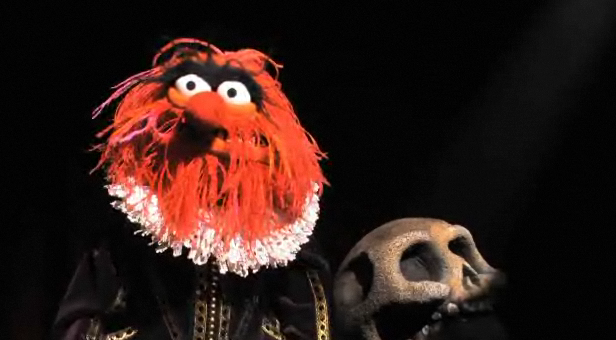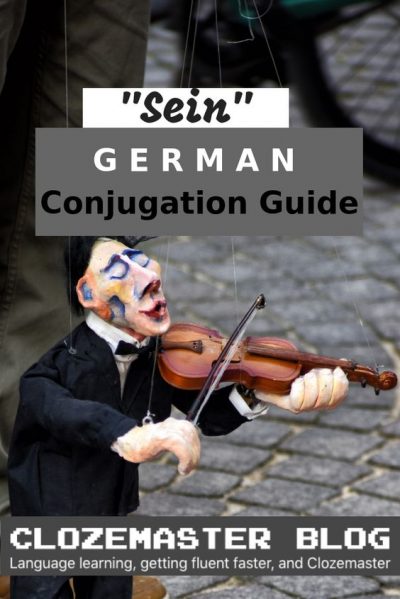
“Sein oder Nichtsein, das ist hier die Frage” (To be or not to be, that is the question) — whether you’re into Shakespeare or not, the famous line from Hamlet, written in 1600 (or possibly 1602), is the perfect opener for today’s topic: the conjugation of the German verb “sein”.
This will not only come in handy when building all-important sentences in German, “sein” also is used as a “helping verb” in combination with other verbs, such as the expression “ich bin gefahren” (I have gone or I have driven), the present perfect tense form of the verb “fahren” (to travel, to go, to drive).
Let’s take a closer look at the conjugation of the German verb “sein”!
Conjugation of the Verb “Sein” – Present Tense (Präsenz)
Singular
| ich bin | I am |
| du bist | you are |
| er/sie/es ist | he/she/it is |
You will most likely notice that in the present tense, or Präsenz, forms of the verb “sein” sound and look nothing like the infinitive of the verb “sein”. Again, this is something you will simply have to learn by heart…
Plural
| wir sind | we are |
| ihr seid | you are (as in: you guys are) |
| sie sind | they are |
Examples:
Ich bin Daniels Schwester. — I am Daniel’s sister.
Ich bin mir nicht sicher, wann am Montag die Schule beginnt. — I am not sure what time school starts on Monday.
Er ist sehr stur. — He is very stubborn.
Bist du auch am Freitag mit dabei? — Are you going to be there on Friday as well?
Conjugation of the Verb “Sein” – Simple Past Tense (Imperfekt)
Singular
| ich war | I was |
| du warst | you were |
| er/sie/es war | he/she/it was |
Plural
| wir waren | we were |
| ihr wart | you were (as in: you guys were) |
| sie waren | they were |
Examples:
Ich war bis Freitag in Berlin. — I was in Berlin until Friday.
Sie waren mit dem Auto verreist. — They went on vacation by car.
Wir waren uns nicht sicher, oben eine gute Idee ist. — We weren’t sure if it was a good idea.
Wart ihr schon einmal in München? — Have you been to Munich before?
Conjugation of the Verb “Sein” – Present Perfect Tense (Perfekt)
Singular
| ich bin gewesen | I was/have been |
| du bist gewesen | you were/have been |
| er/sie/es ist gewesen | he/she/it was/has been |
Plural
| wir sind gewesen | we were/have been |
| ihr seid gewesen | you were/have been (as in: you guys were/have been) |
| sie sind gewesen | they were/have been |
Examples:
Bist du heute morgen hier gewesen? Es war reines Chaos. — Have you been here this morning? It was pure chaos.
Sie ist sehr freundlich gewesen. — She was very friendly.
Ich bin am Donnerstag im Museum gewesen. — I was at the museum on Thursday.
Wir sind noch nie in Frankreich gewesen. — We have never been to France.
Conjugation of the Verb “Sein” – Past Perfect Tense (Plusquamperfekt)
Singular
| ich war gewesen | I had been |
| du warst gewesen | you had been |
| er/sie/es war gewesen | he/she/it had been |
Plural
| wir waren gewesen | we had been |
| ihr wart gewesen | you had been (as in: you guys had been) |
| sie waren gewesen | they had been |
Examples:
Es war ein Heidenaufwand gewesen, die Feier zu organisieren. — It had been an ordeal to organize the party.
Er war nicht sehr freundlich zu uns gewesen. — He hadn’t been very friendly to us.
Du warst damals noch sehr klein gewesen. — You had been very young at that time.
Sie waren noch nie bei uns gewesen. — They had never stayed at our place before.
Conjugation of the Verb “Sein” – Future Tense (Futur)
Unlike the English future tense, the German future tense (Futur) is used much less often. Especially when it comes to the verb “sein”, most Germans — instead of using the future tense — will just use an adverb of time instead.
So instead of saying “Er wird am Dienstag kommen”, Germans would more likely say “Er kommt am Dienstag”, which uses the present tense and an adverb.
Singular
| ich werde sein | I will be |
| du wirst sein | you will be |
| er/sie/es wird sein | he/she/it will be |
Plural
| wir werden sein | we will be |
| ihr werdet sein | you will be (as in: you guys will be) |
| sie werden sein | they will be |
Examples:
Ich werde bis dahin schon in Urlaub sein. — I will be on vacation already by that point.
Sie werden darüber sehr überrascht sein. — They will be very surprised about that.
Es wird sicherlich ganz leicht sein. — It will surely be very easy.
Ihr werdet doch nicht schon losgegangen sein? — You haven’t already left, have you?
Conjugation of the Verb “Sein” – Future Perfect (Futur II)
When looking at the Futur II, the future perfect tense, you will quickly realize it’s an especially mean conglomerate of various versions of the verb “sein” all muddled together in one tense.
The good news is that the Futur II is not used very often. Also, it is not overly hard to memorize, since the last part of the tense (“gewesen sein”) never really changes. Just give it a try!
Again, the Futur II describes an action that takes place in the future, but will have already been finished by that point.
Singular
| ich werde gewesen sein | I will have been |
| du wirst gewesen sein | you will have been |
| er/sie/es wird gewesen sein | he/she/it will have been |
Plural
| wir werden gewesen sein | we will have been |
| ihr werdet gewesen sein | you will have been (as in: you guys will have been) |
| sie werden gewesen sein | they will have been |
Examples:
Es wird sicherlich nicht leicht für sie gewesen sein. — It surely won’t have been easy for her.
Ihr werdet bis dahin schon im Urlaub gewesen sein. — You guys will have been on vacation at that point.
Command forms of the German Verb “Sein” – Imperativ
There are a couple command forms for the German verb “sein” — usually, they are used in combination with other words.
These combinations can look like the following:
Singular
Sei still! / Sei leise! — Be quiet!
Sei brav! — Be nice! (This is something you would typically say to a small child or a dog.)
Plural
Seid still!/Seid leise! — Be quiet (you guys)!
Seid brav! — Be nice (you guys)!
Conjugation of the Verb “Sein” – Subjunctive I (Konjunktiv I)
The subjunctive or Konjunktiv I is a rather unpopular tense in Germany, because it sometimes tends to be a little difficult (even for Germans). The surprising thing about the subjunctive I? It’s technically a mood, not a tense, and most often it is based on the infinite form of a verb.
So where can you find the Konjunktiv I? Most likely you will see it in newspaper articles, where it is used to express indirect speech (or in German: indirekte Rede).
However, indirekte Rede can also be used in spoken language, such as if you are talking about a third person.
Singular
| ich sei | I am (said to be) |
| du sei(e)st | you are (said to be) |
| er/sie/es sei | he/she/it is (said to be) |
Plural
| wir seien | we are (said to be) |
| ihr seiet | you are (said to be) (as in: you guys are said to be) |
| sie seien | they are said to be |
Examples:
Sie sagte mir Frau Meyer sei sehr streng. — She told me Mrs. Meyer was said to be very strict.
Er sagte mir, du seist ein Lügner. — He told me you were a liar. (Or: He told me you were said to be a liar.)
Es gab ein Gerücht in der Stadt, sie sei abgehauen. — There was rumor in town she had taken off.
Er wehrte sich gegen die Anschuldigungen, er sei ein Dieb. — He denied the accusations that he was a thief.
Conjugation of the Verb “Sein” – Subjunctive II (Konjunktiv II)
Unlike the Konjunktiv I, which is used in indirect speech, the Konjunktiv II expresses wishful thinking and situations that are contrary to reality. It is also used to express a polite request. While the German form of the subjunctive II (“wäre”) is very similar to the English equivalents such as “If I were you, I would not do that”, the Konjunktiv II is based off the German simple past tense (Imperfekt).
If you need a memory hook for this tense, the perfect opportunity comes in form of the song “Ich wollt’ ich wär’ ein Huhn” (“I wish I was (or would be) a chicken”), performed by the all-male 1920s close harmony ensemble The Comedian Harmonists.
Singular
| ich wäre | I would be |
| du wärest |
you would be |
| er/sie/es wäre | he/she/it would be |
Plural
| wir wären | we would be |
| ihr wärt | you would be (as in: you guys would be) |
| sie wären | they would be |
Examples:
Es wäre schön, wenn du in Zukunft pünktlich wärst. — It would be nice if you were on time in the future.
Es wäre mir lieber, wenn er nicht dabei wäre. — I would prefer it if he wasn’t there.
Wärst du so gut und sagst ihnen Bescheid? — Could you be so nice and let them know?
Ich wäre jetzt lieber im Urlaub. — I would rather be on vacation right now.
Since both of the subjunctive forms are mood and not tenses, they can be modified to be used in several tenses. Below you can find a couple examples of what this could look like:
Ich wäre gewesen — I would have been
Ich sei gewesen — I am said to have been
Sie seien gewesen — they were said to have been
While these are all part of various forms of the subjunctives, the chance that you will stumble upon them in day-to-day language is rather slim. They are mostly used in more formal settings or in written language.
I hope I could shed some light on the conjugation of the German verb “sein” — as per usual, you can test your knowledge below!
Until next time and viel Erfolg!
Challenge yourself with Clozemaster
Test your skills and see what you’ve learned from this article by playing a selection of sentences with conjugated forms of the German verb “sein”.
Sign up here to save your progress and start getting fluent with thousands of German sentences at Clozemaster.
Clozemaster has been designed to help you learn the language in context by filling in the gaps in authentic sentences. With features such as Grammar Challenges, Cloze-Listening, and Cloze-Reading, the app will let you emphasize all the competencies necessary to become fluent in German.
Take your German to the next level. Click here to start practicing with real German sentences!


